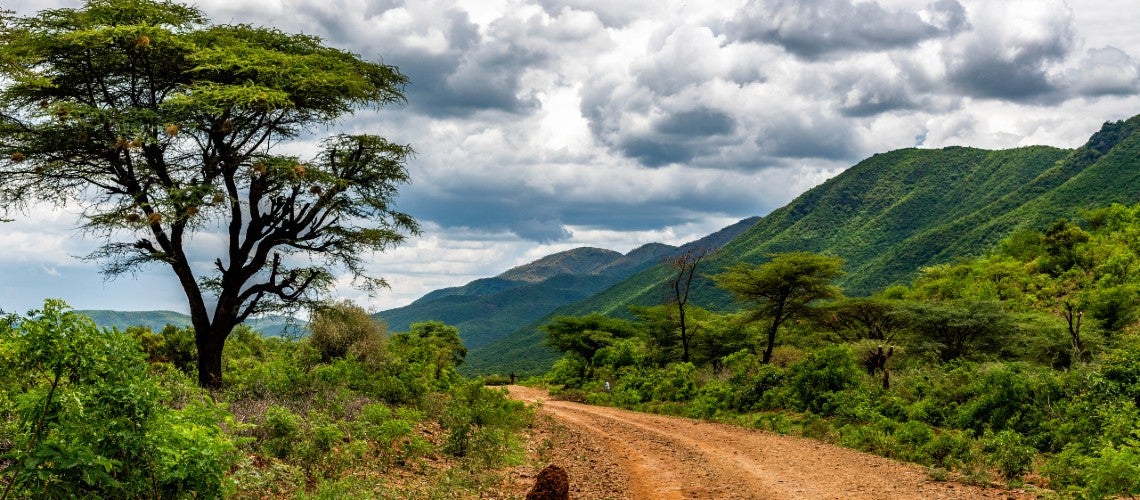 10,000 kilometers of roads in Kenya have been upgraded be resilient to the ravages of climate change through foreign direct investment and guarantees
10,000 kilometers of roads in Kenya have been upgraded be resilient to the ravages of climate change through foreign direct investment and guarantees
Roads and water are age-old enemies.
Water is responsible for most of the damage to the world’s roads, according to the World Bank—damage that increases every year due to the impact of climate change. And roads return the favor, routinely causing water-related problems such as erosion, waterlogging, and flooding.
A warming and wetter climate only exacerbates this ancient and adversarial relationship.
But green roads, designed to serve water and landscape management and provide climate resilience, can help to reverse it.
Green roads are an important part of the global climate adaptation effort that will need to be funded in coming years to maintain existing roads and build new ones —connecting people, driving commerce, and supporting development—while also making them resilient to the impacts of climate change.
And cross-border investment is critical to these climate adaptation projects.
Yet global flows of foreign direct investment (FDI) fell by almost a third—31 percent to be exact—in the second quarter of 2022, according to a recent report by the United Nations Conference on Trade and Development (UNCTAD), which tracks international investments.
Unfortunately, the drop in FDI flows has hurt climate adaptation projects.
The number of climate adaptation projects announced in the first three quarters of 2022 was 12 percent lower than the same period last year. The number of water management projects fell 19 percent. That’s a very bad sign for future FDI flows, too, as announcements are an indicator of forward trends.
Climate change investment—including both climate adaptation and mitigation projects—began to trend up after the adoption of the Sustainable Development Goals in 2015, according to the UNCTAD report, and accelerated in 2021 due to post-COVID stimulus investments. However, “this momentum is now at risk,” UNCTAD warns.
Funding resilient roads in Kenya
MIGA and the World Bank Group are on the case.
Over the past two years MIGA has issued over $186 million in guarantees to help the government of Kenya attract much-needed foreign investment to its ongoing program to upgrade 10,000 kilometers of roads , which will double the number of asphalt-surfaced roads and cut many travel times in half in the East Africa nation.
The program, which is being completed in multiple tranches with separate financing, will include earthworks, concrete works, and drainage works, with climate adaptation measures that include elevated road sections and deeper and wider road drains, pipes, and culverts.
MIGA’s guarantees are issued to equity investors and lenders to protect them from risks associated with breach of contract, transfer restriction, expropriation, and war and civil disturbance, for roads in central and western Kenya. And MIGA continues to negotiate additional contracts to enable more investments in the Kenya roads program.
In addition to reducing travel times, the project is expected to improve road safety and reduce transportation costs. It will also create business opportunities for local shops and vendors while reducing poverty by integrating underdeveloped areas with the rest of the country.
Building a major artery in Serbia
Serbia needs new, climate-resilient roads, too.
The government of Serbia has identified a critical geographical corridor in the West Morava Valley, a low-level flood plain about 200 kilometers south of Belgrade, as ideal for a six-lane, 112-kilometer highway that will be the country’s second major transportation artery.
The new road will run east-west and connect the towns of Pojate and Preljina, linking two pan-European north-south motorways that are connected to regional commercial centers such as Sarajevo in neighboring Bosnia and Herzegovina and the port city of Bar in Montenegro. By doing so, it will expand access to markets in Slovenia, Croatia, North Macedonia, Italy, and Romania, and will improve trade links to Western Europe.
The highway is being designed for climate resilience through the use of drainage and elevation measures through the Morava floodplain. And protection and stabilization of riverbanks and the main river channel in this flooding-prone area will also be a priority.
The project’s construction is being enabled in part by MIGA guarantees of more than $450 million to a group of lenders to the Serbian government. The guarantees will protect the lenders from non-payment risk.
Adapting current roads to the dangers of climate change, while building new ones that are resilient to it, is a major step toward changing the ancient water-road dynamic for the better.
Related links
Blogs:
How guarantees support ESG investing in emerging economies
Using government guarantees carefully as the private sector redefines bankability
A new resource at a pivotal moment: PPP Climate Toolkit for Infrastructure
A blueprint for action to attract private investment in climate adaptation for infrastructure
Press releases:
MIGA Contributes to Kenya National Road Network Upgrade
MIGA Further Supports Kenya Roads Modernization with New Investment
MIGA Supports Construction of Climate-Resilient Motorway in Central Serbia


Join the Conversation